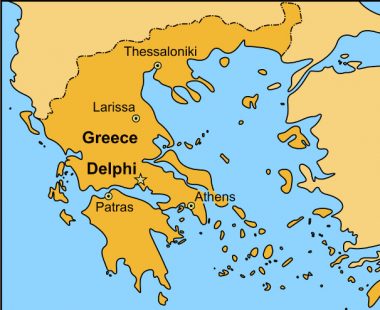The Oracle of Delphi was a Greek center of shrine and predictions in Phocis (Central Greece) under the Mount Parnassus. For nearly a thousand years, people came to Delphi to seek advice from the priestess, either in their own name, or on behalf of a community that sent them to Oracle. The first priest in Oracle in Delphi was women commonly known as Sybil or Sybilla. She sang her predictions, sitting on a rock and breathing evaporation from the ground. She was usually gave confusing predictions.
The name Delphi (gr. Delphoi as center) indicates the worship goddess of the earth Gaia or Gaea. Archaeological research at the end of the 19th century has revealed a vast complex of Apollo sanctuaries hanging on the ramparts: the theater, the treasury, the council, the halls, etc. Above the shrine there was a gymnasium (space for the wrestlers), a temple and a shrine of Athena goddess. The ancient Greek felt itself placed between two opposing deities: Apollo and Dionysus. According to Greek mythology Apollo and Dionysos were brothers and sons of Zeus. Apollos mother was Leto and Dionysos mother was Semele.
Apollo, the light-hearted truth-giver, god of purity, prophecy, the arts and the string-playing and Helios-Apollo, the Lord of the Sun was opposing to Dionysus (also called Bacchus, which was name later adopted by the Romans) the god of the vine and fertility, the ecstasy and the hymn anthemic. Apollo took revenge on Python who was sent by jealous Hera (wife of Zeus) in order to attack Apollos mother Leto. Mythology represent a Python as serpent (or dragon) who lived in Delphi, spilled blood transmitted his clairvoyant abilities to the place. Apollo found a Python in a cove under Mount Parnassus in Delphi, killed him with his arrows and later his body buried in the ground. At the venue of the victory Apollo founded a famous sanctuary. In cove where Apollo killed Python was the source of the steam from the ground that helped the priestess (who were known as Pythia) to fall into the trance. Since the beginning of the 6th century BC Delphi were also the venue for the Pythian Games who held every four years. Oracle of Delphi was also the headquarters of the religious-political alliance of some Greek tribes like Delphic Amphictyony.



What is needed, when seeking advice from the otherworld, is absolute sincerity. This law is subject to the questioner as well as the medium and the Apollo priests. Only with a pure body participants were allowed to enter the district of the god Apollo. But the washing alone was not enough, even the soul has to undergo a cleansing. Therefore, the questioner, before he was allowed to enter the holy consecration district, subjected to examinations. The Pythia, too, was bound by strict rules and absolute chastity. It was known in ancient Greek society that was danger and threatens when curiosity, sensationalism or lust for power was involved in question for Pythia. Danger for both the seeker as well as for the Pythia and its interpreter. Again, enlightenment in the spirit requires purification of the soul beforehand. Otherwise, it was believed that gods will be silent with no answer.
Before the oracle spoke, it took an omen: a priest sprinkled a young goat with ice-cold water. If the animal did not respond, the oracle would fail for that day, and those seeking advice would have to return a month later. If the animal then reacted, it was slaughtered as a sacrificial animal and burned on the altar. The prophecies could begin afterwards. The Pythia, accompanied by two priests, went to the sacred nymph Castalia, where she bathed naked. From another source, she drank some sips of holy water. Now the Pythia went to two priests in the Apollo sanctuary. There she was led in front of the altar of the Hestia (virgin goodness of the hearth), where the intoxicating fumes rose from a crack in the earth. In this trance, she made her predictions. The end of the Delphic oracle came to an end with the Roman emperor Theodosius I in 391 AD. It is known that accurate and precise her predictions was related to Socrates’ fame, years before it became known, then the failure of the Persian invasion of Greece, and the prophecy of Alexander the conquering of the famous world. But the most famous Pythias prediction that can be interpreted in two different ways was: Ibis redibis, nunquam peribis in bello (you will go, you will return, never in war will you perish) or Ibis, redibis nunquam, per bella peribis (you will go, you will never return, in (the) war you will perish”).
